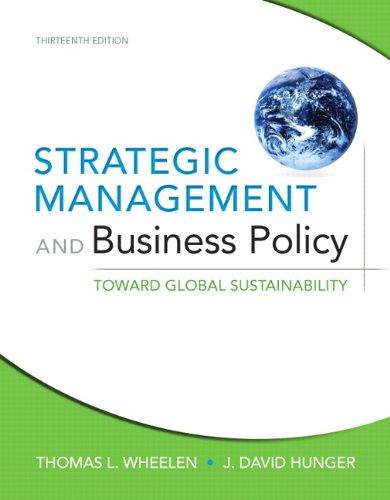Question
5.1 This question makes use of the model of prices, interest rates, and exchange rates in Lesson 5 and embodies all of the assumptions and
5.1 This question makes use of the model of prices, interest rates, and exchange rates in Lesson 5 and embodies all of the assumptions and economic principles of that model.Consider an economy which is initially in a long-run equilibrium. There is then a permanent 10% decrease in the domestic nominal money supply from M1 to M2 = 0.9M1. Assume that there are no changes in domestic output (Yf), the foreign interest rate (R*), or the foreign price level (P*).
a) As the economy adjusts from its initial long-run equilibrium to a new SHORT-run equilibrium in response to this permanent decrease in domestic money supply:
i) the domestic price level (P) will ___________(rise/fall/ not change);
ii) the domestic interest rate (R) will __________(rise/fall/not change);
iii) the expected exchange rate (Ee) will ___________(rise/fall/not change);
iv) the actual exchange rate (E) will ___________(rise/fall/not change).
(4 marks)
b) In the spaces below explain WHY each of the following variables will rise, or fall, or not change in the short-run in response to this permanent decrease in nominal money supply.(4 marks)
i) The domestic interest rate (R):
ii) The actual exchange rate (E):
c) Assume that the economy is initially in a long-run equilibrium in which:
Yf= 100; P*=1.25; M1= 50; R1 = R* = 0.05; P1 = 2.50; E1 = Ee1= 2.0
Assume that the domestic real money demand function takes the following specific form:
Md/P = 0.25Yf - 100R,
Now suppose that the nominal money supply of this economy undergoes a one-time, permanent decrease from M1= 50 to M2 = 45, with no changes in Yf, P*, or R*.Calculate (rounded to 3 decimal places) the values of domestic interest rate (R) and exchange rate (E) which are consistent with the new short-run equilibrium after this decrease in money supply and enter these values in the table below.(2 marks)
Variable New Short-run Equilibrium Value
R
E
d)In the space below show and/or explain your method of calculation of the short-run equilibrium values of R and E, as recorded in the table above.(4 marks)
e) You have shown and explained how this permanent decrease in money supply will cause a change in the short-run equilibrium exchange rate. Other things being equal, this short-run change in the exchange rate (E) causes domestic goods to be ________________ (overpriced/underpriced) relative to foreign goods, resulting in a(n) _______________ (increase/ decrease) in the domestic current account balance. The resulting excess ______________ (demand for /supply of) domestic output leads in the long run to a __________(rise/fall) in the domestic price level. This change in the domestic price level, in turn, causes a(n)______________(increase/decrease) in real money ____________ (demand/supply) resulting in a __________(rise/fall) in the domestic interest rate from its short-run equilibrium level to its long-run equilibrium level and a consequent ___________(rise/fall) in the exchange rate from its short-run equilibrium level to its long-run equilibrium level.(4 marks)
f) In the new long-run equilibrium, the new long-run equilibrium price level (P) of the economy will equal ____________ and the new long-run equilibrium exchange rate (E) will equal _____________.(2 marks)
Step by Step Solution
There are 3 Steps involved in it
Step: 1

Get Instant Access to Expert-Tailored Solutions
See step-by-step solutions with expert insights and AI powered tools for academic success
Step: 2

Step: 3

Ace Your Homework with AI
Get the answers you need in no time with our AI-driven, step-by-step assistance
Get Started


